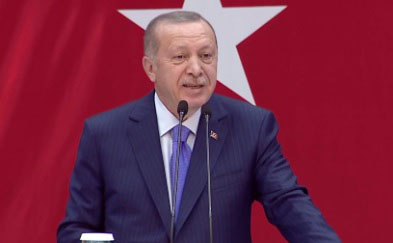Special to WorldTribune.com
 By John J. Metzler, May 21, 2023
By John J. Metzler, May 21, 2023
Another earthquake has jolted Turkey. But contrary to the seismic calamity which devastated large parts of eastern Turkey in February killing more than 50,000 people this was an electoral jolt whose political shockwaves and aftershocks continue to rattle the entire country from Istanbul, through the Anatolian plain to far off Mt. Ararat on the Armenian frontier.
Both the incumbent Recep Tayyip Erdogan (69) and his main opposition leader Kemal Kilicdaroglu (74) contested Presidential and parliamentary elections which took place recently with approximately 89 percent voter turnout, reflecting both deep polarization and political nervousness.
Erdogan won 49.5 percent. But since Sinan Ogan’s ultra-nationalist party gained 5 percent, neither major candidate reached the mandatory 50% of the vote, thus triggering a runoff between the two rivals.

Kemal Kilicdaroglu who leads a fractious coalition of six opposition parties known as the “Table of Six,” ranging from left to right, plans to pull Turkey back to its traditional moorings with the West, the U.S. and NATO.
Over the past decade, an increasingly authoritarian and populist Erdogan has purposefully reoriented Turkey towards Moscow and Beijing.
Many secular Turks and business people in the cities are increasingly nervous over these changes.
So why is this important?
Turkey forms the nexus of a large strategic landmass connecting Europe and the Middle East geographically.
Turkey controls the strategic Bosporus and Dardanelles Straits through which shipping from the Black Sea (Russia, Ukraine, Romania) passes.
Equally Turkey forms the underbelly of the Black Sea, a strategic outlet for Russia.
|
Turkish forces served alongside the UN during the Korean war. To this day, Turkey’s huge land army has proven a reliable force in the NATO command structure. |
Significantly as long-standing NATO member, the Ankara government was admitted to the Alliance in 1952, the country is home to key military facilities including the U.S. Incirlik airbase in the east not far from Syria and Lebanon.
Turkish forces served alongside the UN during the Korean war. To this day, Turkey’s huge land army has proven a reliable force in the NATO command structure.
The Turkish military has often played a decisive political kingmaker.
Indeed the 83 million Turks are not an Arab people; Historically, the Ottoman Turks long dominated Arab lands throughout the Middle East ranging from Iraq and Arabia through North Africa.
Just a century ago in 1923, the modern Turkish Republic was founded by Kemal Ataturk, a tough but visionary reformer who turned this Moslem land into a reasonably modern secular state. Modernism mixed with a secular and Western-oriented styles in the new Republic as hallmarks of the Ataturk era. “Western form, National Content,” became a catchphrase.
Recep Tayyip Erdogan changed the trajectory of Turkish politics twenty-one years ago when his populist AKP party gained power; Erdogan was Prime Minister and now serves as President.
Once a reliable American and NATO ally, under Erdogan Turkey has been leaning towards Russia and indeed China.
A once staunchly secular Muslim country, Erdogan has brought a decidedly Islamic tilt to the social and political fabric, thus creating an aura of the Middle East not of Europe.
Erdogan views the West, through the lens of suspicious historical theories, as plotting to topple his rule.
Since 2017, Erdogan has governed Turkey as a political strongman with sweeping and powerful presidential powers; The “Sultan” has transformed a traditional parliamentary system into a centralized Presidential regime.
|
Once a reliable American and NATO ally, under Erdogan Turkey has been leaning towards Russia and indeed China. |
But two events sidetracked Erdogan’s smooth reelection chances.
Turkey’s economy is buffeted by runaway inflation officially at 44 percent, currency devaluation and a cost-of-living crisis. Yet ironically Erdogan’s first decade in power witnessed strong economic growth, infrastructural development and a tourist boom. That’s no longer true.
The February 7.8 scale Turkish earthquake which killed over 56,000 people and displaced at least 3 million more people has proven the biggest jolt, underlying the Erdogan government’s slow initial response and the often tone-deaf actions by the President in treating his own citizens.
Nonetheless since the start of the Syrian civil conflict more than a decade ago, Turkey has given humanitarian refuge to at least four million Syrians from the war.
So, it’s a runoff between the two top candidates on 28 May. President Erdogan’s AKP party and its nationalist allies lost seats but still control the 600 seat Parliament.
“Erdogan appears to have the better shot at winning that coveted five percent vote. Ogan’s ultranationalism is more compatible with the ruling party’s Islamist outlook than Kilicdaroglu’s social democratic bearings,” notes Gerry Robbins an analyst specializing in Turkish politics. Erdogan has the advantage; Controlling the levers of government, a largely compliant media and the till of patronage.
The Turkish Republic, founded in 1923, will soon choose its destiny for its second century.
John J. Metzler is a United Nations correspondent covering diplomatic and defense issues. He is the author of Divided Dynamism the Diplomacy of Separated Nations: Germany, Korea, China (2014). [See pre-2011 Archives]
